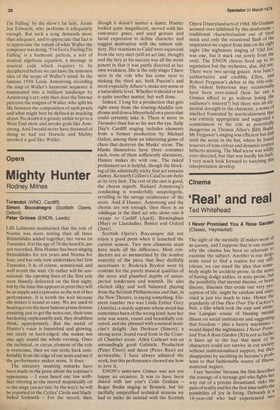Cinema
'Real' and real
Ted Whitehead
I Never Promised You A Rose Garde (Classic, Haymarket) The sight of the mentally ill makes most of us queasy, and I suppose that is one reason why the cinema has been so reluctant io examine the subject. Another is our desPerate need to find a reason for our afflictions; we can stand the idea that somebody might be accident-prone, in the sense of having dodgy ankles, or acne-prone, htl. t the possibility that mental disease, or brain disease, illnesses that erode our very Perception of life, might be random and uninvited is just too much to take. Hence the popularity of One Flew Over The Cuckoo s Nest, a film which took the easy and attractive Laingian course of blaming mental illness on social institutions and suggesting that freedom plus a hearty machismo would dispel the nightmares. I Never Promised You A Rose Garden (X) is not so facile; it faces up to the fact that most of its characters could not survive in our societY without institutionalised support, but then disappoints by ascribing its heroine's problems to that fashionable source of illness, maternal neglect. I say 'heroine' because the film describes the courage of a teenage girl who fights her way out of a private dreamland, risks the pain of reality and for the first time sniffs .the possibility of joy in living. Deborah is a 16-year-old who had experienced two severe traumas in childhood: first when her mother left her for a while after a miscarriage, and second when she had to undergo an operation for a tumour on the urethra, and the anaesthetist told her that She was going into 'dreamland'. There she has stayed ever since, in a state of catatonic Withdrawal . Her dreamworld is like something out of Red Indian mythology, barbarically savage and beautiful, with its own language and rules— one of which is that she Must never divulge its secrets to the inhabitants of the 'real' world.
When Deborah tries to commit suicide by Slashing her wrists, her parents entrust her to a psychiatric hospital to be 'cured', i.e. to he treated to enable her to lead the normal bourgeois life they lead themselves. The sympathetic Dr Fried (Bibi Andersson) Seems rather dubious about this but assures them that she will do all she can to enable the girl to make a rational choice of the life She would like to lead herself. Over the course of the following three years she holds a series of consultations during which she fights to win Deborah's confidence and to Persuade her that the dreamworld is an Invention of her own mind — one which, if she wishes, she can eventually abandon. Whether the film's depiction of an American psychiatric hospital in the midFifties is at all accurate I can't say; but it seems all too predictable that the chief Obstacles to Deborah's progress should be the other patients, shizoid, paranoid or Marooned in their own impenetrable dreamlands. I found it difficult to watch the agonies and inadequacies of these unhappy women, however, and their physical humiliation is embarrassingly real. They have two male warders, one a gentle paternalist, the other a sadist who takes out his frustrations on the patients. Deborah's admiration for the 'real' world is not encouraged when she reports his violence to br Fried and discovers that the doctor can do little about it.
The doctor's absence on vacation, and the release of a friendly patient, plunge peborah back into nightmare; but the turning point comes when the doctor returns and begins to probe the girl's profound ambivalence towards her father. It emerges t'tat the father had infected his daughter With his own neurotic guilt and fear of sexuality. On learning to see this awesome authority-figure as equally vulnerable and v,mised, Deborah finds the courage to Lace up to her own fears and accept the Possibilities of the real world — to risk being hurt but also being loved. If the premise is dubious, and the treatment sometimes too glossy, the film is also Painfully real in its picture of crippled minds and fading bodies, confronting life's cruelty without exploiting it. Gavin Lambert has brilliantly adapted Joanne Greenberg's a.ovel, and Anthony Page's direction, sensitive and extraordinarily powerful, draws an outstanding performance from the reang Kathleen Quinlan as the girl who eaves her dream behind.







































 Previous page
Previous page